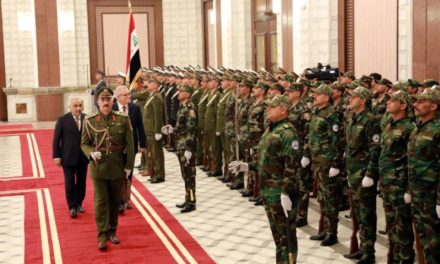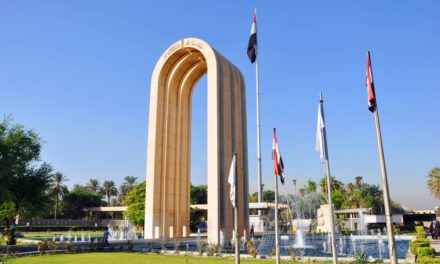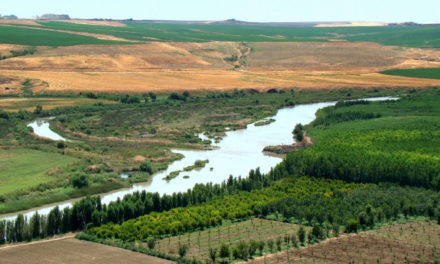(Photo: Sergey Malgavko)
The battle to liberate Iraq from Da’ish (the so-called Islamic State) heralded a rebirth of sorts for the Iraqi Armed Forces in the aftermath of the disastrous collapse of multiple divisions during the terror group’s offensive during the summer of 2014. Mocked and insulted, the different branches of the Iraqi military, aided by the newly formed Hashd Al-Sha’abi (Popular Mobilisation Forces), recovered and embarked on a path of redemption which saw them completely recapture all ground lost by the end of 2017. Since then, the Iraqi military has managed to keep the terrorists at bay, but the rebirth is far from finished.
Recruitment, training, organization and modernised command structures are all necessary steps that must continue to be worked on but a key component that is in dire need of attention is equipment. The Iraqi military desperately needs billions of dollars worth of new equipment in order for it to take its place amongst the strongest forces in the Middle East.
Every branch of the Iraqi armed forces is crying out for modern equipment, from the Air Force (Happy 89th Birthday!) that has less than 30 F-16IQ jets as the tip of its spear to the Ground Forces that still operate Soviet-era main battle tanks. But no part of Iraq’s military is lacking equipment quite like the Air Defence Command.
Simply put, Iraq’s air defences are non-existent. Once upon a time, Iraq boasted a relatively powerful and well-integrated network of air defence systems, built for Saddam Hussein’s regime by France and the Soviet Union. Today the picture could not be more different. Aside from the 24 Pantsir-S1 short-range systems delivered by Russia 4 years ago, the country of roughly 40 million citizens’ airspace is open to all. Basic air surveillance radar systems and the severely under-equipped Iraqi Air Force is the nation’s best hope of anything that remotely resembles an air defence capability.
Step forward, the S-400 Triumf long-range surface-to-air missile defence system. The latest iteration in the fabled family of Russian air defence systems, the S-400 is one of the most advanced and capable defence systems currently on the market. The S-400 is not only in the same conversation as anything the United States or any other Western power has to offer, but would also be available at a fraction of the price. Able to engage targets as far as 400km away under heavy signal jamming, the formidable S-400 was created with the intimidation of fifth-generation aircraft in mind.
Murmurings of Iraq’s intent to purchase the state-of-the-art S-400 have been heard regularly for years. Iraqi politicians, such as former Foreign Minister Ibrahim Al-Ja’afari and Iraqi ambassador to Russia Haidar Hadi, fuelled the discussion of such a purchase whenever an enquiry was made, reiterating the need for Iraq to arm its military, the difficulties involved and the sovereign rights of Iraq to make such decisions regarding its military independently. In May of last year, a member of the Iraqi parliament’s Security and Defence Committee claimed that negotiations were underway to purchase the S-400, but nothing concrete materialised.
The murmurs became much louder after the American assassination of Quds Force commander Qassim Soleimani and deputy chief of the Hashd Al-Sha’abi Abu Mahdi Al-Muhandis in January. The Iraqi parliament took steps to initiate the withdrawal of American troops out of the country and Iraq’s capability, or lack thereof, to defend itself against such actions became a hot topic within political discourse once again. Igor Korotchenko, a member of the Russian Defence Ministry’s public council, claimed that Russia was willing to supply the S-400 to Iraq alongside other systems.
On Saturday, Iraq’s Al-Sabah newspaper reported that parliament’s Security and Defence Committee had submitted an official report to the office of outgoing Prime Minister Adil Abd Al-Mahdi requesting the purchase of the S-400 system. This seems to be the first concrete step taken towards initiating the process of acquiring the S-400. The final decision will be made by the Abd Al-Mahdi’s replacement, with Prime Minister-designate Mustafa Al-Kadhimi approaching the final phase of his transition into office.
However, that decision is not as straightforward as it seems. Tumbling oil prices will have a significant impact on Iraq’s economy moving forward, likely postponing weapon purchases for the time being. Even if the funds for such a deal are made available, there is a much bigger obstacle to the deal: the United States.
The recent procurement of S-400 systems by Turkey has had major implications on Turkish-American relations with the U.S. still deliberating on the implementation of CAATSA (Countering American Adversaries Through Sanctions Act) sanctions. The blowback has been substantial and the S-400 remains a sizeable point of contention between the Turks and NATO.
The reaction to Iraq purchasing the S-400 would likely lead to similar objections from the U.S. with former State Department spokesperson Heather Nauert stating in 2018 that, “We are communicating with governments all around the world, such as Iraq and others, about the CAATSA law, and making those governments aware of how they could run afoul of the CAATSA law and the potential repercussions as a result.”
The threat of CAATSA-related sanctions is significant, especially when taking into account the rough economical burdens already facing the next Iraqi Prime Minister. While Iraq’s purchase of the S-400 would not carry the added humiliation of a NATO and F-35 Joint Strike Fighter Program member using a Russian air defence system to protect its airspace, it is unlikely that the Iraqi government will escape with just a verbal rebuke.
Nevertheless, the next government should prioritise the acquisition of an advanced air defence system. The last few years have witnessed hundreds of airspace violations by the Turkish Air Force as they carried out airstrikes against the Kurdistan Workers’ Party (PKK) enclaves in northern Iraq, leading to dozens of civilian casualties and entire villages being evacuated. The Iraqi government and military have issued countless condemnations of the constant stream of breaches of Iraqi sovereignty but the reprimands have been belligerently dismissed and ignored by Ankara. In addition, the Israeli Air Force carried out a series of airstrikes against Iranian-backed units within the Hashd Al-Sha’abi umbrella along the Iraqi-Syrian border last year, mainly targeting weapons storage facilities. The lack of any credible deterrent means these infringements on Iraqi sovereignty will not end any time soon without meaningful steps being taken to protect Iraqi airspace.
The probability of the United States, which has just deployed Patriot missile batteries and C-RAM system in major bases across Iraq to protect American troops from sporadic rocket attacks, offering American-made air defence systems to Iraq is low due to political tensions as well as fears of Russian or Iranian spies gaining access to such sophisticated systems. Even if the Americans did offer downgraded systems, they would like cost double the price of the S-400.
It should also be noted that the only real credible case against buying the S-400 or any other long-range air defence system right now is that Iraq lacks the other components needed to create an effective integrated air defence network. Iraq will also need much more advanced radar and early warning systems, short and medium-range missile launchers, better command and control infrastructure, electronic warfare and counter-stealth capabilities in addition to more investment in the Iraqi Air Force. Building a protective dome around the country will require much more than the S-400. But the rebuttal to that argument is that the S-400 can act as a stop-gap measure and a serious deterrent on a short-term basis, while the Air Defence Command gradually rebuilds itself.
The Iraqi S-400 saga will likely drag on for a while to come. The issue is incredibly complex and will require negotiations and the ruffling of a few feathers. What we can be sure of is that the Iraqi military proved during the liberation battles that they are, once again, an institution that the Iraqi people can be proud of and the time has come for them to be appropriately equipped to carry out the job required of them. The purchase of the S-400 system will not only reinforce Iraqi control over its own airspace but it will be a major step in the rebirth of the Iraqi Armed Forces.

Haidar Sumeri
Haidar Sumeri is a Middle East observer, mainly focusing on Iraq’s war on terrorism.










